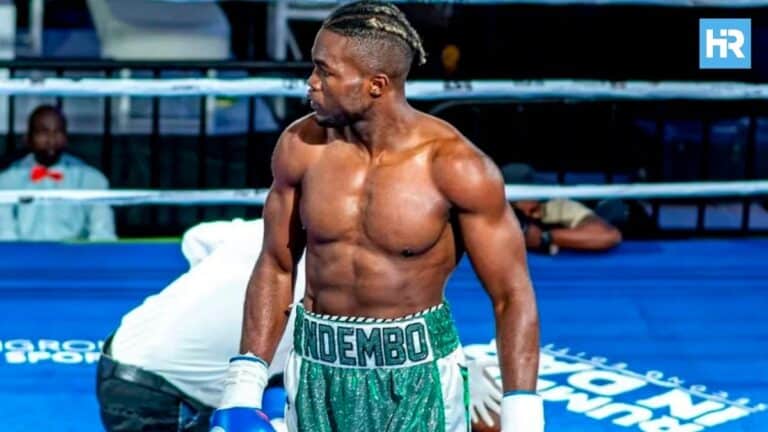
This report uncovers the tragic stories of boxers who died from ring-related injuries, highlighting the sport’s inherent risks.
It also examines how these losses shaped boxing, sparking vital reforms and stronger measures to protect fighters.
- Ardi Ndembo died after spending three weeks in a medically induced coma due to injuries from a boxing match.
- The boxing world’s reaction, including tributes and support initiatives, shows the community’s commitment to supporting families affected by such tragedies.
- The deaths of several boxers over the decades have led to significant safety reforms in the sport, aiming to protect current and future athletes.
The Fight That Took Ndembo’s Life
Recently, heavyweight boxer Ardi Ndembo, only 27 years old, tragically died after a knockout led to a three-week coma.
The Congolese boxer, who was undefeated with an 8-0 record before the bout, faced Nestor Santana in Miami on April 5, 2024.
During the fight, Ndembo suffered a critical injury that rendered him unconscious, with the need for immediate hospitalization. Subsequently, he was placed in a medically induced coma to manage his injuries but passed away shortly after.
Check out our ranking of the best boxers!
Boxing Community Mourns Ndembo’s Passing
The boxing community has expressed profound grief and shock over Ndembo’s untimely death.
Viva Promotions, the organization representing Ndembo, released a heartfelt statement via the New York Post: “We at Viva Promotions mourn the loss of Ardi Ndembo, a talented Congolese boxer who tragically passed away after a knockout in a Team Combat League match on April 5. He remained in an induced coma until his untimely death. RIP Ardi Ndembo!”
Additionally, Jeff Mayweather, an uncle of renowned boxer Floyd Mayweather and a member of the Team Combat League, shared his thoughts on the perils of boxing.
In an interview with The Sun, he remarked, “Boxing’s a sport where you grow up watching it and loving it, but there’s so much risk involved. Anyone can lose their life from boxing. When something like this happens, it wakes up the whole entire world. I don’t think boxing’s a bad sport, because you can die in any sport. You drive a race car at 200 mph, if it slides, you’re going to die, too. You can die in any sport, but boxing is a brutal sport.”
Tributes and Support for Ndembo’s Family
In memory of Ndembo, the boxing league held a solemn 10-bell salute and pledged up to $25,000 in matching donations to a GoFundMe supporting his grieving family.
His death leaves behind a wife and two children, underscoring the sport’s grave risks and reigniting urgent calls for stronger safety measures to protect fighters.”
Remembering Boxers Who Lost Their Lives in the Ring
Throughout the 20th and 21st centuries, the sport of boxing has witnessed the untimely and tragic deaths of many fighters, which have sparked significant changes in regulations to improve the safety of the sport.
Here is a detailed look at some of these fighters, the circumstances of their deaths, and the resulting safety improvements:
Frankie Campbell (August 25, 1930)
Frankie Campbell’s tragic death occurred during a match against Max Baer in San Francisco. In the brutal fight, Campbell suffered a fatal brain injury.
Despite being knocked down and telling his corner “something feels as though it broke in my head,” he continued to fight until he was eventually knocked out. After the fight, he never regained consciousness and died due to severe brain trauma.
This incident led to public outcry and changes in boxing regulations, including improved safety equipment and medical standards for fighters. The referee and both fighters’ management teams were suspended due to their roles in the tragedy.
Davey Moore (March 21, 1963)
Davey Moore died following a fight with Sugar Ramos during which he was knocked down and his neck struck the bottom rope, causing a severe brain injury.
He initially appeared coherent after the fight but later slipped into a coma and died three days after the match.
His death raised significant concerns about the safety of boxing rings, particularly the design of the ropes and corners, leading to changes in their construction to improve safety.
Kim Duk-koo (November 13, 1982)
The tragic death of Kim Duk-koo followed his brutal Las Vegas bout with Ray ‘Boom Boom’ Mancini. After 14 grueling rounds, a decisive blow left Kim with severe brain injuries, and he passed away four days later in the hospital.
His death reshaped boxing, prompting the reduction of championship fights from 15 to 12 rounds and ushering in stricter medical protocols and monitoring to safeguard fighters.
Jimmy Doyle (June 24, 1947)
Jimmy Doyle lost his life in a fight against Sugar Ray Robinson. Doyle was knocked out in the eighth round, and despite immediate medical attention, he died from brain injuries.
The tragedy highlighted the need for better pre-fight medical examinations and monitoring, which led to more rigorous medical oversight and procedures within the sport to enhance fighter safety.
Benny Kid Paret (March 24, 1962)
Benny Kid Paret died following a televised title bout against Emile Griffith. Paret was knocked into a coma during the fight and died ten days later due to brain injuries.
The incident caused widespread debate and led to significant changes in boxing, including improved medical protocols and stricter regulation enforcement, particularly regarding the medical suspensions and licensing of boxers.
Honoring the Boxers We Lost
The heartbreaking stories of fighters who died in the ring reveal the sport’s inherent dangers and sacrifices. Their courage and dedication to boxing stand as both inspiration and a call for stronger safety measures and improved protective standards.
These athletes’ legacies live on not only through their talent and determination but also through the ethical debates they continue to spark about the future of combat sports.
As fans, trainers, and competitors reflect on their journeys, it is essential to remember these boxers for their passion, resilience, and love of the sport—rather than solely the tragedies that marked their final moments.”









